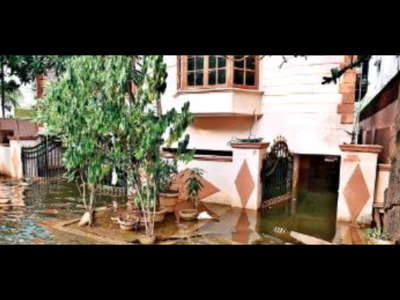The Times of India 10.12.2010
BMC house seeks to strip MMRDA of power
MUMBAI: It has been a source of friction between the Brihanmumbai Municipal Corporation (BMC) and the Mumbai Metropolitan Region Development Authority (MMRDA). Now, eight years after the state government empowered the MMRDA with rights by giving it special powers to execute infrastructure projects- till then the domain of the BMC- the civic general body has passed a resolution, seeking that these powers be rescinded.
On Thursday, a PIL was filed in the Bombay high court by social activist Raj Awasthi, seeking the withdrawal of the special powers. A notice of motion moved by Shiv Sena corporator Rahul Shewale was unanimously approved by the BMC’s general body early this month and was sent to the municipal commissioner for his remarks before it is submitted to the state government. “The amendment made by the state government is in direct conflict with the rights guaranteed by the constitution to the local authority,” said Shewale’s notice of motion.
In 2002, the government had amended the MMRDA Act (Section 17), bestowing the state agency commissioner with the BMC chief’s power to conduct crucial civic works. Till then, the MMRDA used to be restricted to being only a planning body. With the new powers, the agency could invite tenders and award multi-crore infrastructure projects. However, this led to frequent tussles between the two agencies that kept passing the buck on to each other when it came to projects such as widening and improvement of roads and stormwater drains. The July 26, 2005 deluge in Mumbai was the flashpoint when the BMC accused the MMRDA of destroying the drains and their connectivity that had worsened the situation. However, the MMRDA was considered the “big brother” as none other than the chief minister is its chairperson.
Municipal commissioner Swadheen Kshatriya said he would have to study the power-withdrawal proposal carefully before giving his opinion. “It’s a sensitive issue and I would not like to comment,” he said. MMRDA commissioner Ratnakar Gaikwad was not available for comment.
“The amendment made by the state government is in direct conflict with the rights guaranteed by the constitution to the local authority,” said Shewale’s notice of motion.
BJP corporator Ashish Shelar said the MMRDA’s powers were dictatorial in nature, while the BMC had to function in a more democratic way. “Whatever the MMRDA decides, it is final but the BMC’s proposals have to go through different committees for approval,” he said. However, the flip side of this is that the MMRDA commissioner can execute projects quickly while the BMC chief cannot proceed unless the corporators give the green signal.
According to Awasthi’s PIL, projects and development proposals of thousands of crores of rupees are passed in the MMRDA “without any knowledge of the directly elected representatives of the wards”. “Moreover, there is no vigilance department in the MMRDA and so they Thus, functioning of MMRDA is being done function in a completely un-democratic manner, which is contrary to what was expected to achieve through the 74th Amendment in the Constitution,” it said.
On Thursday, a PIL was filed in the Bombay high court by social activist Raj Awasthi, seeking the withdrawal of the special powers. A notice of motion moved by Shiv Sena corporator Rahul Shewale was unanimously approved by the BMC’s general body early this month and was sent to the municipal commissioner for his remarks before it is submitted to the state government. “The amendment made by the state government is in direct conflict with the rights guaranteed by the constitution to the local authority,” said Shewale’s notice of motion.
In 2002, the government had amended the MMRDA Act (Section 17), bestowing the state agency commissioner with the BMC chief’s power to conduct crucial civic works. Till then, the MMRDA used to be restricted to being only a planning body. With the new powers, the agency could invite tenders and award multi-crore infrastructure projects. However, this led to frequent tussles between the two agencies that kept passing the buck on to each other when it came to projects such as widening and improvement of roads and stormwater drains. The July 26, 2005 deluge in Mumbai was the flashpoint when the BMC accused the MMRDA of destroying the drains and their connectivity that had worsened the situation. However, the MMRDA was considered the “big brother” as none other than the chief minister is its chairperson.
Municipal commissioner Swadheen Kshatriya said he would have to study the power-withdrawal proposal carefully before giving his opinion. “It’s a sensitive issue and I would not like to comment,” he said. MMRDA commissioner Ratnakar Gaikwad was not available for comment.
“The amendment made by the state government is in direct conflict with the rights guaranteed by the constitution to the local authority,” said Shewale’s notice of motion.
BJP corporator Ashish Shelar said the MMRDA’s powers were dictatorial in nature, while the BMC had to function in a more democratic way. “Whatever the MMRDA decides, it is final but the BMC’s proposals have to go through different committees for approval,” he said. However, the flip side of this is that the MMRDA commissioner can execute projects quickly while the BMC chief cannot proceed unless the corporators give the green signal.
According to Awasthi’s PIL, projects and development proposals of thousands of crores of rupees are passed in the MMRDA “without any knowledge of the directly elected representatives of the wards”. “Moreover, there is no vigilance department in the MMRDA and so they Thus, functioning of MMRDA is being done function in a completely un-democratic manner, which is contrary to what was expected to achieve through the 74th Amendment in the Constitution,” it said.


